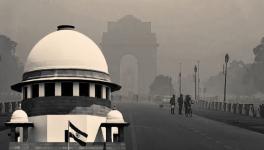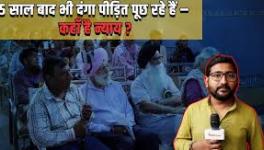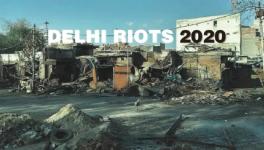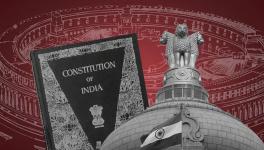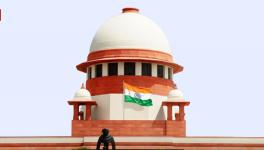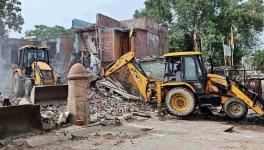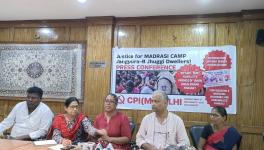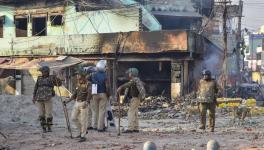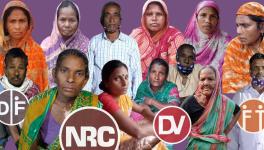Delhi Violence: Activists Oppose Aadhaar in Compensation Forms
The Delhi Government has made Aadhaar mandatory in the compensation form for victims of the riots in the capital’s North East region. This move has been met with criticism from activists and organisations working on the ground. Rethink Aadhaar, a campaign which aims to share relevant data and findings from the ground on experience of citizens with the Aadhaar project, has released a statement condemning the move.
Their statement said: “Homes, possessions, properties, valuables, and lives have been lost in this violence. In this ongoing crisis, many have lost everything in arson incidents including their identity cards. To ask survivors of a riot, which has also been described as a pogrom, to prove their identity is both impractical and often an impossibility.” The statement added that this is the “latest brutal example of the shifting of the state's burden of identifying and compensating victims of violence upon the victims themselves.”
The experience of victims of the violence, who have taken shelter in rehabilitation camps set up across North-East Delhi by the Government, paints a grim picture. Nisar Ahmed, an elderly resident of Garhi Mandu village, near Khajuri Chowk, lost his home and all his possessions during the riots. He has taken shelter in the relief camp in Kacchi Khajuri. Talking to NewsClick, Ahmad said: “My home was burned down during the riot. I had spent all my savings on buying things for my daughter ahead of her wedding. It’s all gone. We lost all our identification documents, including our Aadhaar cards and voter identification cards.” Ahmad however said that a relative had a copy of his Aadhaar, which he could procure to apply for compensation. However, not all victims would be this lucky.
The statement released by the Rethink Aadhaar campaign said: “The Aadhaar project, at the best of times, does not work. It is riddled with problems, the very least of which include wrong names, birth dates, addresses, incorrectly entered details. To make such a shoddy system a prior condition for aid in a time of disaster and crisis is reprehensible and must be stopped.”
The campaign has demanded that the Delhi government remove the demand for Aadhaar numbers from its compensation forms. It said that the campaign urges the government to take all the necessary steps to provide aid and support to survivors “without imposing any further conditions.”
There have been cases from various parts of the country where people were deprived of social benefits due to Aadhaar. The biggest example of this has been denial of access to the public distribution system (PDS), leading to a large number of starvation deaths in the country. Since 2015, according to Rethink Aadhaar, as many as 90 starvation deaths have been reported from various states, out of which 42 are a direct result of Aadhaar-related exclusions. A statement released by them during the previous week said: “The deaths of 11-year old Santoshi Kumari and 64-year old Premani Kunwar, both in Jharkhand, found their way into mainstream reportage but most deaths have gone unreported. Worse, the government has continued to deny that the deaths are a result of Aadhaar related exclusion, even in response to questions in Parliament.”
In it’s Aadhaar judgement, referring to the exclusionary nature of the biometric ID, the Supreme Court said: “In fairness to the petitioners, it is worth mentioning that they have referred to the research carried out by some individuals and even NGOs which have been relied upon to demonstrate that there are number of instances leading to the exclusion i.e. the benefits are allegedly denied on the ground of failure of authentication. The respondents have refuted such studies. These become disputed question of facts. It will be difficult to invalidate provisions of Parliamentary legislations on the basis of such material, more particularly, when their credence has not been tested.”
As per a recent report in The Hindu about the Poshan Abhiyan, the scheme aiming to eradicate malnutrition by 2022, about one in three Aadhaar-based payments under the Pradhan Mantri Matru Vandana Yojana have been wrongly transferred to a different bank account. This means, officially, at least 8.76 lakh women have not got what was entitled to them under the programme. Rethink Aadhaar says that the real estimates would be much higher than this.
According to the campaign, roughly 20% of National Food Security Act beneficiaries were excluded in Rajasthan because they did not have Aadhaar cards. These 1 lakh people did not receive the rations they were entitled to for a long time, despite being a part of the scheme, due to their inability to produce their Aadhaar cards.
Human rights activist Usha Ramanathan told NewsClick: “The Aadhaar project was started with the promise that it will ensure inclusion. However, it has done exactly the opposite. It has kept people from receiving the benefits that they are entitled to.”
In their statement, Rethink Aadhaar said that the wounded are still coming to terms with the paperwork at hospitals. “First-hand witnesses are figuring out ways to deal with the documentation and evidence collection,” it said. What those affected by the inhumane violence do not need is to scramble for papers at a time when everything around them smells of ash.
Get the latest reports & analysis with people's perspective on Protests, movements & deep analytical videos, discussions of the current affairs in your Telegram app. Subscribe to NewsClick's Telegram channel & get Real-Time updates on stories, as they get published on our website.









